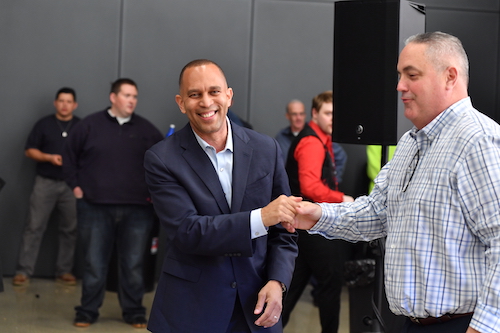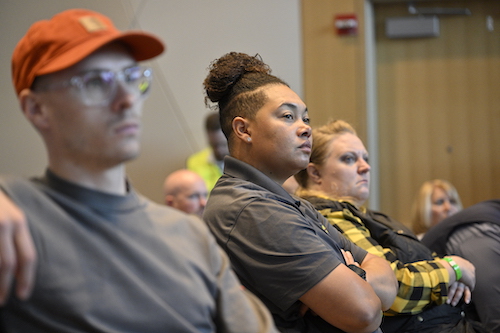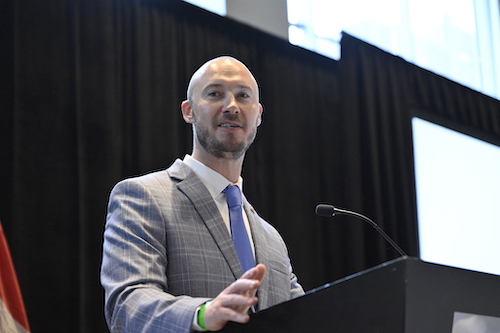Leaders and presenters during Friday’s Government Affairs Caucus celebrated the election of President Joe Biden and gains made by working people and the labor movement during his tenure.

|
| New York Rep. Hakeem Jeffries, center, shakes hands with Chicago Local 134 Business Manager Don Finn before addressing the crowd during a celebration at Local 134's hall on May 6.
|

|
|
Members listening and watching during the Government Affairs Caucus on May 6, 2022.
|
They warned, however, that momentum will be lost if members aren’t mobilized to elect pro-working family candidates later this year – not just in Congress, but in local and municipal elections as well.
"Right now, as we sit here, there’s never been a labor union closer to the president of the United States than the IBEW is now,” Assistant to the President for Government Affairs Austin Keyser said. “It’s been said that President Biden is the most pro-union president of our lifetime. That’s not true. There’s never been a more pro-union president ever.”
Biden, who often singles out the IBEW by name, will address the IBEW’s 40th International Convention on Wednesday in Chicago. Last November, he signed his sweeping $1.2 trillion infrastructure bill into law that will bring tens of thousands of jobs for IBEW members while delivering on a number of other campaign promises. His administration fought back against proposed changes to defined benefit pensions and revamped the National Labor Relations Board so it provides more protections to workers, among other pro-labor initiatives.
“It’s a little disappointing but some of our members don’t always see that,” Keyser said. “Some of them are emotional voters. But you’re here because you’re leaders and we’re depending on you to take [this information back] to those members and show them.”
International President Lonnie R. Stephenson served on Biden’s transition team, the first union head to serve in such a role. Labor Secretary Marty Walsh, who will address the convention on Thursday, is the first union member to serve in that position in 45 years. The former Boston mayor is a member of Laborers’ Local 223.
“There are so many things this president has done that a lot of our members out in the field don’t realize. …We must get to those folks,” Stephenson said. “We have to educate them about who is going to be the best candidate for them and their jobs. We can’t give up on them.”
New York Local 3 Business Manager and International Executive Council Chairman Chris Erikson put it more bluntly: “I don’t understand how an electrician can make the argument that the wall [along the Mexico and U.S. border] is more important than the economic security of my family.”
Stephenson pointed to the upcoming Senate race in Ohio, where Democratic nominee Tim Ryan has been a consistent advocate for working families during his nearly 20 years in the House of Representatives. A Republican takeover of either the House or Senate would grind much of the Biden administration’s agenda of supporting working families to a halt.
“As much as I would like to take a break, it’s not time to let up,” said International Secretary-Treasurer Kenneth W. Cooper, an Ohio native. “It’s time to double down, especially in the United States.”
The caucus also included a panel on how unions can best secure work coming from the infrastructure bill and an address from Daniel Blaikie, the only IBEW member serving in Canada’s parliament.
Blaikie, a Red Seal electrician and member of Winnipeg, Manitoba, Local 2085, represents the Elmwood-Transcona Riding as a member of the New Democratic Party. He was re-elected to a third term last year, receiving 49.7% of the vote in a five-candidate field.
That was quite a change from his first race in 2015, which he won by 51 votes out of about 43,000 cast, the closest federal race in Canada that year.
“I’m proof that every vote counts,” Blaikie said.
The NDP is traditionally Canada’s most-pro labor party. It has taken on added importance in recent years because the Liberals, who also are generally pro-labor, hold the most seats in Parliament but not a majority. Both parties have come together to pass legislation favorable to workers, and Blaikie’s influence in the House of Commons has grown.
As in the United States, the IBEW has a close relationship with the highest echelons of power. Prime Minister Justin Trudeau has been a good friend of labor and a key ally of the IBEW.
Blaikie credited First District International Vice President Thomas Reid and Matthew Wayland, the Canadian Director of Government Relations, for making sure the IBEW “punches above its weight” in national politics.
“To use what seems like the theme of [the caucus], when you’re properly grounded, you can’t be neutral,” Blaikie said. “You’ve got to run hot.”
The infrastructure panel, which was moderated by Government Affairs Director Danielle Eckert, included St. Paul, Minn., Mayor Melvin Carter, who noted that his family’s fortunes changed when his grandfather became a member of the Boilermakers. He said that city officials have partnered with St. Paul Local 110 to build electric vehicle charging stations and to do away with the lead pipes still being used in part of the city’s water system.
“If we’re talking about the climate crisis and investing in people,” Carter said, “there’s nothing better than the trades.”
Betony Jones, a senior workforce advisor at the Department of Energy, said it is “so important to communicate what you’re doing about diversity, inclusion and access” when applying for federal projects brought about by the infrastructure bill. While most requests for bids are required within 60 days of being announced, the process will be longer and unions, including the IBEW and its signatory contractors, must be able to quickly reply when asked for more information, she said.
“We know that income and wealth disparities shrink when unions are stronger, but a lot of people don’t,” Jones said. “Continuing to share that message is really important.”
Marco Giamberardino, vice president for government and public affairs for the National Electrical Contractors Association, said understanding wage rates in geographic areas also is crucial putting together a bid. NECA is the longtime partner of the IBEW and federal projects are required to favor Davis-Bacon laws. Many local projects must follow project labor agreements and NECA will work with the IBEW to strengthen them, he said.

|
|
Austin Keyser, Assistant to the International President for Government Affairs, gives the opening remarks at the Government Affairs Caucus on May 6.
|
“Working together with local leaders on how to put these agreements together is crucial,” Giamberardino said.
Later Friday, Rep. Hakeem Jeffries of New York, the chair of the House Democratic Caucus, addressed delegates and friends of the IBEW at a separate event held at Chicago Local 134’s hall.
Jeffries’ district includes parts of Brooklyn and Queens and he was introduced by Erikson, a longtime friend.
“For decades in Washington, it has been infrastructure week every other week,” Jeffries said. “Nothing ever happened. But then Joe Biden came to town and the Democrats in the House and Senate came together to pass that historic agreement.”
“The American Dream fundamentally is that if you work hard and play by the rules, you should be able to provide a comfortable living for yourself and your families,” Jeffries added. “Educate your children. Own a home and retire with grace and dignity. That is the American dream. Two entities have delivered that in the United States of America: Organized labor and the Democratic Party.”
Jeffries noted both his parents were members of a social workers’ union, which led to him and a younger brother being able to attend college without any debt. He thanked the IBEW for its support, adding he was especially pleased members will be building out broadband and high-speed internet to underserved communities.
“I know that the IBEW is going to connect America,” he said. “We’re thankful for the work you’re doing and you’re going to keep doing.”